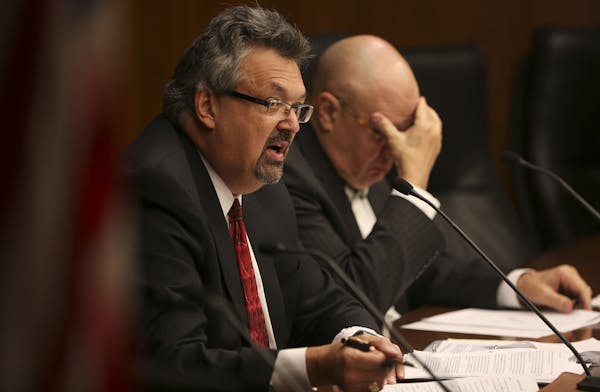Minnesota Attorney General Lori Swanson is seeking to block the proposed release of a serial rapist from the state Sex Offender Program, raising vehement warnings to Gov. Mark Dayton in correspondence about the dangers to the public if the man is freed.
But in an interview Friday with the Star Tribune, Dayton rebuffed Swanson's efforts and voiced support for the recommendations made by the Department of Human Services (DHS) to release Thomas Duvall, a rapist who has attacked at least 60 women. Duvall also kept logs of his fantasies while in therapy that describe his desire to sexually attack juveniles.
"Look, I share the same feeling as the public — lock 'em up the rest of their lives, why should we take a chance?'' Dayton said. "But the real question is are we ever going to take responsibility for this backdoor, indiscriminate way of leaving these people warehoused forever?"
A special DHS review board concluded in August that Duvall had shown enough progress in treatment to warrant recommending that a panel of judges grant him a provisional discharge.
If the state Supreme Court Appeal Panel agrees with the DHS, the 57-year-old Duvall would become only the second person in 18 years released from the controversial program. The state is under federal court pressure to end its policy of continuing to hold offenders in the prisonlike sex treatment program indefinitely, even after they've completed treatment.
In an e-mail exchange in September between Dayton and Human Services Commissioner Lucinda Jesson, the governor raised specific questions about Duvall's therapy records and the severity of his crimes, but told Jesson he would defer to her judgment.
The e-mails were released by Jesson's office after the Star Tribune requested them under the Minnesota Data Practices Act. Neither Jesson nor Swanson would comment on the case.
Separate records obtained by the Star Tribune from sources show that Duvall's sexual "fantasy logs" — used as a therapy tool — contain "sexual thoughts and fantasies related to juveniles and sexual violence." Duvall's writings show that he objectifies women as "sexual body parts," mixing fantasies with memories of his past rapes, the documents reveal.
As recently as 2012, Duvall was considered "a high-risk" to sexually offend again, according to assessment records reviewed by the Star Tribune. In seeking to block Duvall's release, Swanson questions how an offender who was deemed unfit for discharge just a year ago could now be considered rehabilitated.
After Swanson alerted Dayton in September to her concerns about Duvall, the governor wrote an e-mail to Jesson on the evening of Sept. 30, under the heading, "Mn Sex Offender Release dispute between AG and Cindy Jesson." The body of Dayton's message reads: "Cindy, I'll support your doing whatever you think is right. How do you respond to the 2012 fantasy logs? Also to the # & severity of his crimes? Mark."
Hours later, Jesson replied, explaining that she supported Duvall's petition for release "despite his horrendous past" because he met the treatment criteria for provisional discharge.
"The sexual histories of almost all the sex offender clients DHS treats are horrendous," she wrote. "Sadly, the number of victims of Mr. Duvall is not atypical."
Jesson said provisional discharge is based on "the picture of the person after treatment. Even if the individual committed terrible crimes before entering the program, the question is where the person is after treatment."
Further, she informed Dayton that it was "significant" that the Hennepin County attorney's office, which prosecuted several of Duvall's rapes, agrees with her position that he should be released.
"As far as the 'fantasy logs,' these sexual logs are actually a treatment tool," Jesson wrote. "Clients are encouraged to be honest about their sexual thoughts." She admitted that there is "no ironclad promise of success," but she assured Dayton that Duvall would not be released into "the general community" and would be more closely monitored than counterparts leaving state prisons.
In the past, the DHS has said that a released offender would be required to wear an electronic monitoring bracelet 24 hours a day, take regular drug tests, be under camera surveillance in a residence and be accompanied by a counselor while in public or at work.
Dayton, in the Friday interview, said previous administrations and legislative sessions have "ducked" the issue of what to do with offenders who have served their prison sentences and completed the sex offender program. He believes it's time to confront how to balance the outrage that people feel toward sex offenders with the constitutional issue of keeping them behind bars indefinitely, in legal limbo.
"The public deserves to have a vigorous debate in the Legislature next session on longer sentencing for convicted sex offenders, in order to deal with this issue on the front end," Dayton said.
"We've got to be extremely careful and get this right because nobody wants to make a mistake and put another person in jeopardy," he added. "Because what do you say to the parents of the next teenage girl who's been raped by one of these offenders who's been released? That's my principal worry."
De facto life sentence
Currently, 698 offenders have been indefinitely committed to the Minnesota Sex Offender Program (MSOP), held under what is regarded as a de facto life sentence within barbed-wire-protected facilities in Moose Lake and St. Peter.
A class-action suit has been filed in federal court by offenders who say their confinement violates their constitutional rights, since they've completed both court-ordered prison sentences and treatment. The DHS has formed a 15-member task force that is expected to provide reform recommendations to state legislators by December.
Last year, an aging pedophile who was found not to be a significant risk was granted a provisional release. In May 2012, a state judicial appeals panel rejected the department's recommendation to release John Rydberg, a serial rapist with a criminal history similar to Duvall's.
In August, a special review board within the DHS recommended to a panel of judges that they grant Duvall's petition to be released.
But in recently filed court papers, Swanson argues that the judges' panel should not consider Duvall's release until they've heard her attorneys present evidence that she says contradicts the review board's finding. Her motion to intervene and argue that the judges order an in-depth hearing — similar to a trial — will be heard Nov. 8.
In October, the Hennepin County attorney's office sent a letter to the panel's chief judge asking that Duvall be released without a hearing. The office said the court should order Swanson to destroy any of Duvall's medical records in her possession.
Swanson's attorneys will argue that the MSOP records are not accurate and that the plans to release Duvall are ill-considered. For example, the review board's records show that Duvall sexually assaulted 60 victims. But Duvall admitted to an expert that he "had up to 100 'hands on' victims and up to double that number in total victims, with his first rape occurring when he was 15 years old," documents show.
Swanson also has questioned why the DHS would consider it appropriate to discharge Duvall to a Twin Cities halfway house where he lived when he raped a teenage girl while on a temporary pass, just weeks after his 1987 release from prison.
In 2012, after Duvall had petitioned for release, a court-appointed doctor evaluated Duvall and concluded he was a "sexual sadist," warning there was little in the treatment records that addressed that fact. Duvall "doesn't recognize that his attitudes towards women do not represent 'disgust,' but hatred, deep seated hostility and elements of homicidal rage," the doctor wrote. He said Duvall "fails to recognize he was on track to kill a victim."
After a second doctor — hired by the DHS — voiced concerns over Duvall's "fantasy logs," Duvall withdrew his discharge request.
In April, he applied again and was last assessed in June, reportedly progressing well enough for Jesson to support his discharge.
Having a voice
Two weeks ago, Jesson acknowledged that Swanson has raised legitimate public safety concerns, but said she would not waver in her position. In a letter to the court, she said that she'd be willing to have Duvall evaluated again but that one of her experts was not available until January.
In a statement Friday, the Hennepin County attorney's office said it didn't oppose Duvall's discharge because he has completed his treatment. "He has done everything society has asked him to do and he's coming out under very strict conditions. Fundamental fairness requires that he be given the opportunity to live in a less restrictive environment," the statement said.
Two of Duvall's victims, raped at ages 17 and 15, filed affidavits with the court, describing how they were repeatedly attacked while he held a knife or shotgun to them. One woman, whom Duvall raped with a curling iron, said in her affidavit that when she met with an assistant Hennepin County attorney in August, she was told that Duvall "has a very low risk [of] reoffending."
She said the attorney, George Widseth, made her feel disregarded and told her that the federal court would order an end to the program if no one is ever released.
"I was told that Duvall would be released and that it was a 'done deal,' " the woman stated. "Duvall brutalized me, violated me and left me for dead. I believe I earned the right to have a voice in these proceedings."
Paul McEnroe • 612-673-1745
'Human error' behind Robbinsdale shelter-in-place alert that was mistakenly sent countywide

Going to Wolves or Twins tonight? How to get there (and maybe avoid traffic).
Focusing on bringing football film into frame

